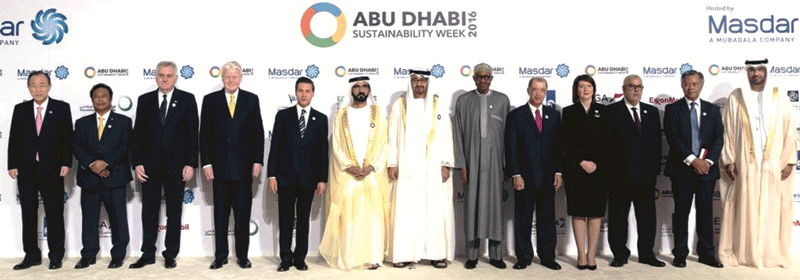Attracting more than 33,000 delegates, including over 80 government ministers and visitors from 170 countries, ADSW (Abu Dhabi Sustainability Week) is the Middle East’s largest gathering focused on addressing the interconnected challenges of energy and water security, climate change and sustainable development.

Commenting on the opening ceremony, President Muhammmed Buhari called for greater global cooperation against the devastating effect of climate change to avert disaster for the human race.
In his keynote speech, UN Secretary-General Ban Ki-moon stressed the need to turn political will into decisive action on renewable energy and sustainable development, as part of the fight against climate change. He praised the UAE’s leadership in sustaining the political momentum in the wake of the Paris Climate Agreement, reached in December, to achieve a better future for people across the world.
He told delegates: “We have a vision, (and) we have goals. There is also political will. We are the first generation with an opportunity to end poverty, but we are the last generation with a chance to combat climate change. Clean energy is the key to both of these tests. Sustainable energy is the thread that connects economic growth, social equity and our efforts to combat climate change.
“UAE and Masdar are a perfect example of the kind of public-private action that is needed. I congratulate Abu Dhabi on bringing together so many different partners including world leaders,” he added.
As the first high level global sustainable development event to take place since the Paris Climate Agreement, ADSW examined how to turn the ambitious goals of the Paris Climate Agreement and the 2030 Agenda for Sustainable Development into practical and innovative policy, investment, technology and partnership solutions, with a focus on identifying actions that can be taken by both the public and private sectors.
In special remarks, delivered at the opening ceremony, President Enrique Peña Nieto of Mexico said: “One of the biggest challenges facing humanity is to have enough clean energy to meet future demand for energy. All nations of the world are vulnerable to the effects of climate change, and we therefore all have a duty to assume a global responsibility.
“Mexico is committed to the environment. We have made the decision to transition to less-polluting forms of fuel and to adopt renewable energy. Our belief is that it is possible to secure a new climate regime, without impeding economic and social progress. Abu Dhabi, and particularly Masdar, represent tangible examples of innovative environments aimed at sustainable economic and social progress.”
In his address to the opening ceremony, Dr Sultan Ahmed Al Jaber, UAE Minister of State and Chairman of Masdar, said: “We convene at a moment of unprecedented unity. The Paris Agreement, last month, marked the culmination of over a decade of challenging negotiations. Never before has the political will to address climate change and achieve sustainable development been so resolute. And never before have market forces aligned so closely with political choices.
“Achieving sustainable development and meeting the worlds’ growing demand for energy cannot be met by one source alone. All energy sources both traditional and new must work hand-in-hand. And that is why our leadership has prioritized economic and energy diversification as fundamental pillars to achieving sustainable development,” added Dr Al Jaber.
“There has never been a greater opportunity to make progress against the sustainable development goals and to create an economic potential that can drive sustained growth for future generations. Here, at the Abu Dhabi Sustainability Week, we can start to build bridges between governments and businesses to create durable partnerships and to address the world’s most pressing challenges in sustainability. So let us be brave bold and ambitious. Let us use this week to maintain the momentum and to capitalize on this historic opportunity to lift the global economy and carve a practical pathway towards a sustainable future,” continued Dr. Al Jaber.
ADSW 2016 brought together thought leaders, policy makers and investors to address the challenges and opportunities of renewable energy and sustainable development through policy dialogue and action. ADSW 2016 promoted multilateral cooperation and bold decision making to accelerate the adoption of the sustainable solutions needed to realise the economic aspirations of future generations and to accommodate rapid global population growth.
The week also showcased the UAE’s leadership in addressing the critical issues defining the sustainability agenda, such as innovation and water security and reinforce Abu Dhabi’s position as an international energy and sustainability hub, capitalising on the clear economic opportunity of clean energy and water security. ADSW will also play a vital role in growing awareness, stimulating public debate and motivating action to address the vital regional issues of sustainability – energy efficiency, water conservation and waste recycling.
ADSW, which ended on Saturday, January 23rd 2016 is structured around four key pillars: policy, leadership, business and awareness and academic research.
Held as part of ADSW, the World Future Energy Summit (WFES) is the world’s foremost event dedicated to the advancement of renewable energy, energy efficiency and clean technology. The four-day conference programme addressed a range of key themes across clean energy. It will include sessions on the future of global energy in a low hydrocarbon price environment; financing the future of energy; new projects in the MENA solar sector and climate change and the UAE.
By Oluwatosin Kolawole (ClimateAid International), Abu Dhabi, UAE
